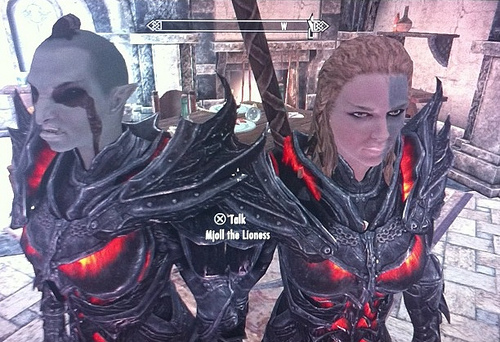Everything that makes The Elder Scrolls V: Skyrim such an amazing game is exactly the same stuff that I dislike in pen-and-paper role-playing games. You can learn a lot from Skyrim about how, well, not everything—there is plenty in Skyrim to rave about apart from that—but the core mechanics of the game that stand out to me as exceptional are three things that bug me about table top game design. You can learn a lot from Skyrim about how to run a game, but some lessons can only be learned by looking at what doesn’t work in a tabletop game and considering how and why it works in a computer game.
The first thing, one of the big things, is the nature of how Skills and levels work. Quite simply, your skills increase the more often you use them. You start Skyrim a tabula rasa, unarmed and untrained. If you start swinging a sword, you’ll get better at One-Handed; if you throw fireballs you’ll get better at Destruction Magic. How you play the game determines what you get good at doing, and raising skills is how you get experience towards the next level. It is a really fun way to personalize your character without the awkward construct of a character class, and it is very sly to build the game so that it adapts to your play style.
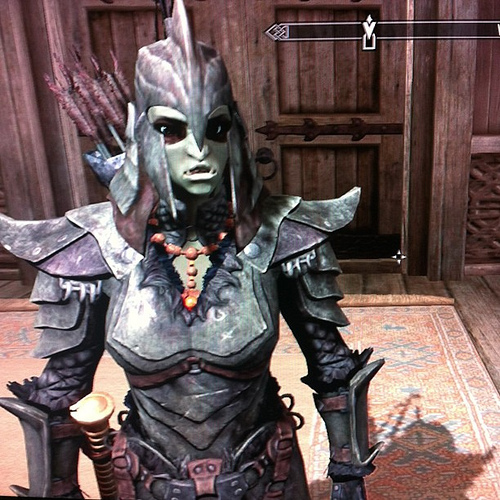
The thing is… I hate it when table top games do this, and lots of them do, to one degree or another. Some games you put a little hashmark down when you use a skill, and cash those in to level the skill. Other games give you extra experience points when you use your skills or spells. From a rational level, I get how that makes sense… but I really dislike it, for two reasons. One: stop looking at your character sheet. I usually use the analogy of calling a game’s mechanics “little white lies.” They help tell the story… but too much of them can interfere in the story. I don’t need you to micromanage your Excel spreadsheet, I want you to collaboratively tell a story with me!
Skyrim, however, is a computer game, which sounds obvious but it means that it can do the math for you, in the background, freeing you up to pay attention to what is actually happening. Which, actually, is pet peeve number two: I really hate tiny little bean counting bonuses in role-playing games. It is a big complaint about the current crop of d20 games, whether you play Pathfinder or D&D Next or 4e. Don’t give me a tiny little conditional +2. You know I won’t remember that, when push comes to shove, and frankly, how often will it come up? Something like “dwarves have a +2 against poison”—you know that your character will never be targeted by an opponent with a poisoned weapon, or if you are you’ll forget that you have a bonus, or if you remember it you’ll roll a 1 or a 20, making that +2 entirely superfluous.
In Skyrim, though, there is that same computer behind the scenes, keeping track of your +7% to sneak gloves and your +15% pick pocket boots. Those little bonuses are used over and over again—that is the nature of the game—and the game remembers when to apply them for you. Flips my opinion right over; now suddenly the sweet set of Daedric Armor I crafted and enchanted myself isn’t something I need to micromanage; the game does it for me. Though hey, if you like micromanaging, there is Alchemy and plenty of potion inventories to shuffle through…
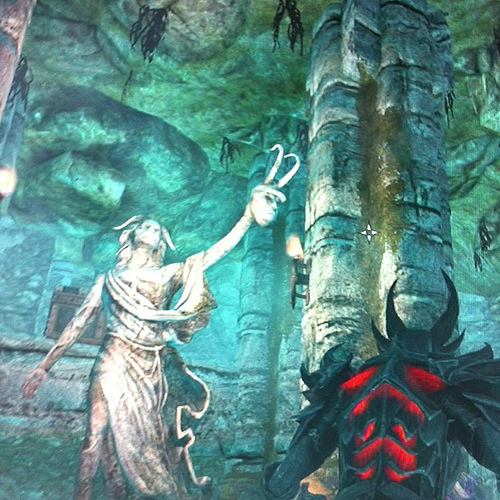
The third thing is a big one: it is that it is a lonely world. Your lonely world. Wait, I don’t mean “a lonely world” like, the map, the setting, the terrain. The fact that the landscapes are gorgeous is just something on a continuum, just something I expect as games continue to get better and better as the technology progresses. I think Skyrim is prettier than, for instance, Assassin’s Creed III, but not qualitatively so; they are part of the same visual context. That is true, but not what my point is.
(Actually, a better comparison might be to one of the greatest games of all time, The Shadow of the Colossus. In both games, the setting is as much a character as you are; heck, in both games the setting is the predominant “character” for most of the game. Running around looking for giants, admiring the landscape? Check and check! And Skyrim is a really pretty place; more than a few times I’ve had to stop and pan the camera around just to marvel. But! I’m getting off topic.)
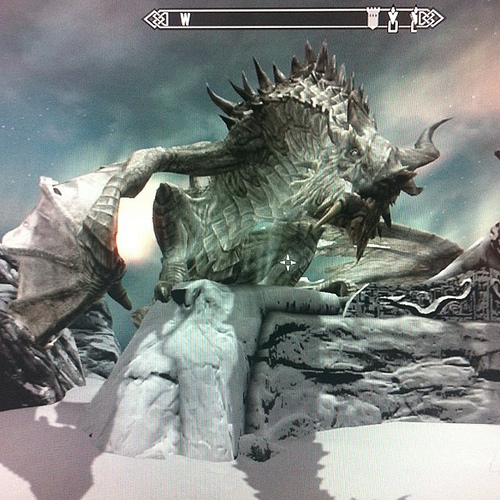
What I mean is: the big thing with Skyrim is that it a solo mission; an open world that you don’t have to share, and you can do a whole lot of things. Which, again, the whole point of tabletop RPGs is that we are sharing the story, from the person running the game to the people playing the characters. Sure, there are solo and duo adventures, but that is the exception, not the rule. In Skyrim, you are more than just the star of the story; you’re the solipsistic center of the universe. You can make—well, not any choice, and I would say that illustrates why table top games are the best, forever—but a lot of choices, including the choice to do nothing. Those choices? Are the foundation upon which the story rests. The axis on which the world turns. You join the Empire? Well, spoiler alert, the Empire is going to win. You join the Stormcloaks? Same thing.
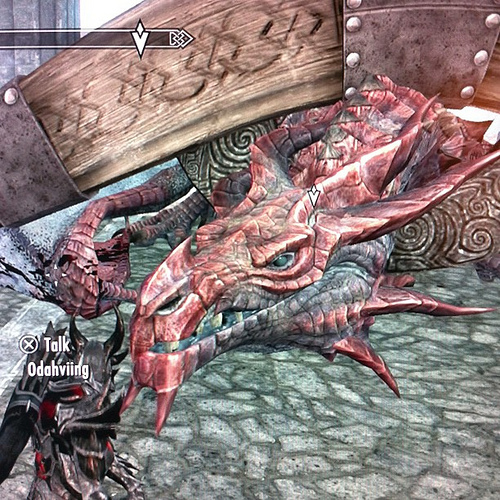
I suppose I just find it interesting, as someone who has had to explain that when I say I play role-playing games I don’t mean World of Warcraft more than a few times. I have always found the term “RPG” a little off-putting for computer games—they aren’t really about playing a role, usually, though they’ve evolved more in that direction—but I can definitely see the family resemblance, so to speak. What I find interesting is that, well, what makes a game like Skyrim is just so different from what makes a RPG campaign work. I’m interested in both what I as a Dungeon Master (or Game Master or Narrator or Storyteller, pick your poison) can learn from it and…well, frankly I’m interested in putting this Daedric Mace that I handcrafted RIGHT between Alduin the Worldeater’s beady little eyes…
Mordicai Knode is playing an female Orc (of course he is) named Mauga; no last name, but going off the Orc naming conventions she’d probably go by Mauga gro-Dovah. Follow him on Twitter or Tumblr.










